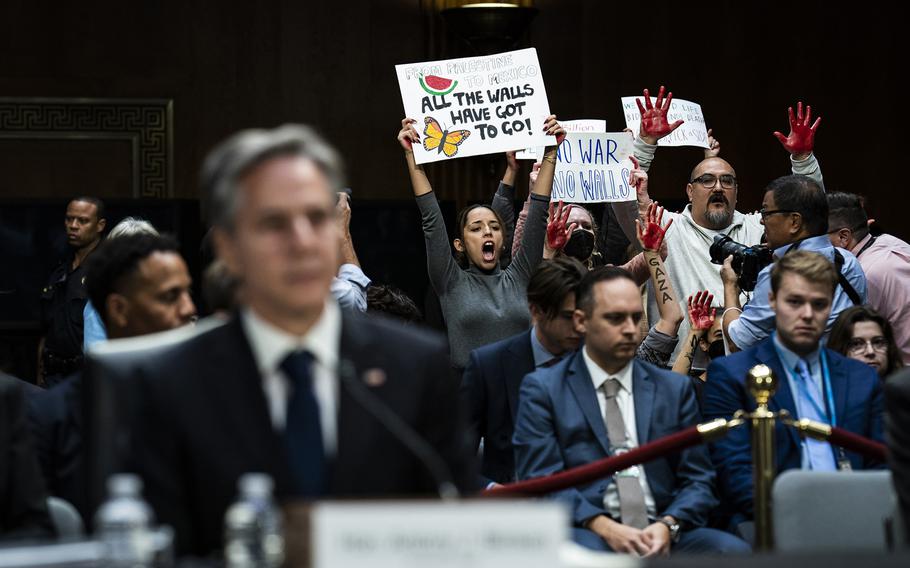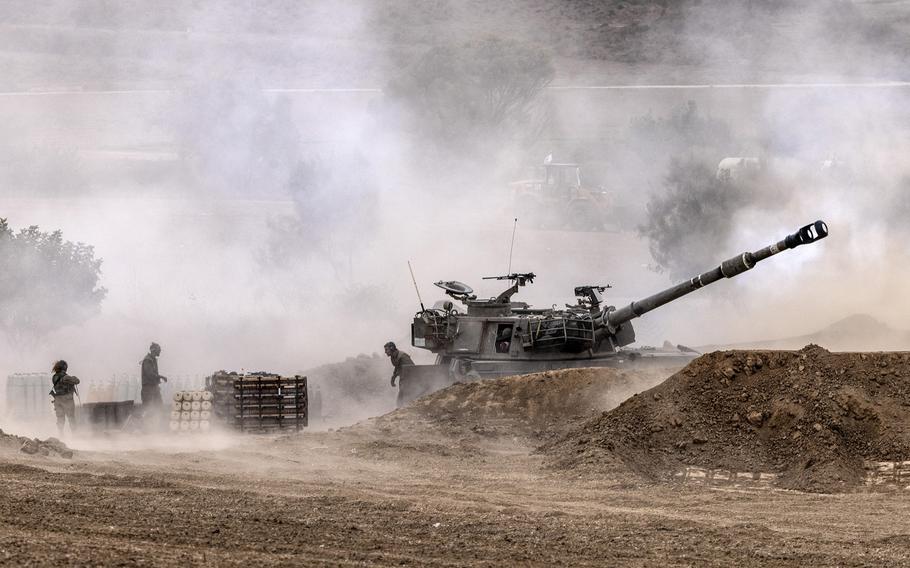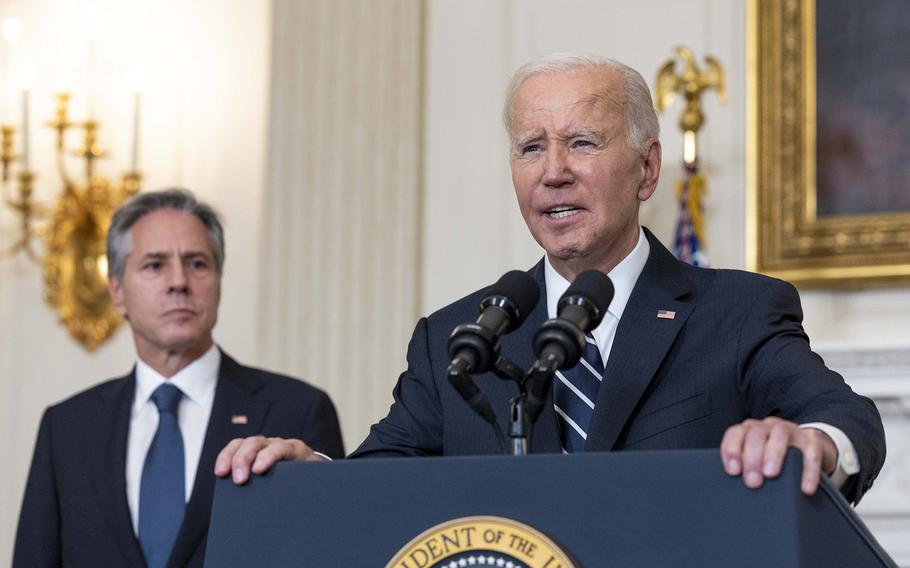Middle East
Far from the fighting, the Israel-Gaza war divides friends, families
The Washington Post November 3, 2023

Activists protest war in Gaza on Oct. 31, 2023, when Secretary of State Antony Blinken and Defense Secretary Lloyd Austin testified during a Senate Appropriations Committee hearing in Washington about the United States sending aid to Israel and Ukraine. (Jabin Botsford/The Washington Post)
It started - well, it pretty much ended - when Abigail Grafton said the wrong thing to her foster daughter, something about the war in Israel, something that has so frozen their relationship that they are now not speaking at all.
It was in one of their weekly calls between Grafton’s home in Berkeley, Calif., where she’s a psychotherapist, to her daughter’s place in Israel, where she’s a psychotherapist.
“I said something bad,” Grafton recalled. “I shouldn’t have said it. I made an analogy between our American right wing and Israel. She started screaming and screaming, and she said I have dementia. We haven’t spoken since.”
Thousands of miles from the bloodshed and bombings of the Israel-Gaza war, in American families rattled by their own country’s division and discord in recent years, the traumas and travails of a faraway conflict have seemed all too close in the month since Hamas’s surprise attack killed 1,400 Israelis.
Friendships and familial bonds, between fellow Jews or fellow Palestinians, across religious lines, and among people with no particular connection to the Middle East, have been damaged, ruptured and - every once in a while - even a bit repaired as treacherous conversations about the war take Americans down uncharted paths.
There’s the retired Navy officer in Maryland, a nominal Christian with roots in Norway and Switzerland, who mainly just listens to her cousin’s ex-wife - unbendingly critical of Israel - fearful that expressing her own middle-of-the-road views could jeopardize their bond.
There’s the young engineer in northern Virginia, an observant Jew who decided to stop a conversation with a friend that had devolved into an argument about who cares more about dead babies. And there are people who have left their church because their pastor seemed so rigidly committed to one or the other side of the conflict.
Americans who have lived for years with painful polarization - sorting themselves into red and blue, pro- and anti-Trump, embracing or rejecting masks and vaccines - now find themselves falling into surprisingly deep fissures over the Middle East conflict. From fleeting encounters with strangers to anguished arguments with lifelong friends, the war has engendered tension, distance, silence and occasionally even moments where people with opposing perspectives hear each other anew.
Grafton, a left-wing member of the egalitarian Jewish Renewal movement who is married to a woman, had worked hard to maintain a relationship with the daughter whom she had taken in as a teen. The daughter, who did not respond to a request for an interview, had moved to Israel, met and married an Orthodox man, and adopted conservative social and political views.
They had managed to tiptoe around their differences - they’d long ago stopped talking about abortion - until the Hamas surprise attack that led to the war. The daughter saw that Grafton’s wife had posted memes from the anti-Zionist Jewish Voices for Peace group, whereupon the daughter unfriended her mother’s wife.
“I love my daughter, but I don’t feel a way to reach out to her right now,” Grafton said.
The daughter has spent recent days dyeing zizit - the knotted tassels that observant Jewish men traditionally wear to remind themselves of the divine presence - a khaki shade to send to Israeli soldiers at the front.
The mother has spent her days joining online meditations and discussions among leftist Jews, talking about protests and demonstrations that might move Americans to focus on the plight of Palestinians in Gaza.
The mother said: “To see my people conducting a holocaust is very disappointing.”
The daughter said: “I do not discuss solutions to this with people whose lives are not impinged on by the answer. Why don’t you give your land back to the Indians?”
To which the mother could only say, “I have no answer to that.”
Now they are silent with each other. “I have no idea what to do,” Grafton said. “The whole world has no idea what to do.”
‘How far do I push my viewpoint?’
Across the country, in organized efforts and informal gatherings, people are trying to bridge the divide or at least listen to people on the other side. A Washington Jewish center is offering a class on “What It Takes: How to Talk About Israel-Palestine,” in which a rabbi will offer “tips to help you have more productive discussions across differences and approach this emotional topic with open-mindedness, nuance and respect.”
Kate James jumped in without any such guidance. Before Oct. 7, James hadn’t focused on the Middle East. Now she wakes up at night worrying about the Palestinians and the fact that, to her mind, they’re too often an afterthought. Which bothers her as a Christian.
At her large, nondenominational church near Phoenix, James wanted people to know that, as she wrote to her pastor, “It’s very important to me we are Christ-like in how we think about and act towards the innocent Palestinians.” She was upset that the social media images the church put out about the conflict were all about supporting Israel - or praying the crisis would bring converts to Jesus. None specifically empathized with the Palestinians.
“Where is your voice for these innocents?” she wrote.
The pastor’s assistant wrote back: Didn’t you see the image that said “pray for the innocent civilians” everywhere? It “was intentionally inclusive of all people who will suffer through this, including Palestinians.”
Still upset, James sent a group text to the eight women in her small church group: “My God!! Are we so pro-Israel we don’t care what’s going on in Gaza???!”
She got only one response: “I highly recommend talking to one of our church’s pastors instead of living in fear or being upset.”
James, a retiree in her 60s, worries that the conflict is unearthing deep tensions between her and the community she’s built since moving to the Phoenix area about five years ago.
“I don’t want to lose people in my circle,” she said. “How far do I push my viewpoint, while respecting where they’re coming from too?”
She’s already seen how the war can sow division among friends. James and two friends lead Bible study groups at church. After their meetings on Wednesdays, they go out for Mexican food. In the first weeks after the Hamas attack, one of the women shared a pro-Israel video with them that she said would provide good historical context for their lunch talk.
“If it’s exclusively pro-Israel, it will bum me out,” James texted back. “While I am concerned about Israel, I am also very distressed over what is happening to the innocent Palestinians.”
The friend replied: “The Palestinians were told by Israel to leave. Hamas told them to stay. Hamas is pure evil.”
James watched part of the video, found it too one-sided, and texted back: “I don’t think I want to discuss this teaching in depth.”
A few minutes later, she tried another tack: “We maybe could talk about it some, but we’d have to be careful. We may not all agree with every point. But there should be room for that, shouldn’t there?”
From there, the conversation went south.
“It’s Hamas that puts no value on life,” the other friend texted back. “They voted for Hamas. There are consequences for who you vote for.”
James shut down the thread: Hamas and the Palestinians are not the same thing, she said. “I am NOT debating this in text.”
Clear across the country, in Westminster, Md., Wayne Willoughby had the mirror image of James’s exchange, with the presiding bishop of his church, the Evangelical Lutheran Church in America.
Though Willoughby had been a member of his church for 20 years - including four as president - that relationship ended last month when the bishop, Elizabeth Eaton, seemed to Willoughby to shift some blame for Oct. 7 onto Israel. Just days after the Hamas attack, Eaton called “the power exerted against all Palestinian people . . . a root cause of what we are witnessing.”
Willoughby, 67, wrote to Eaton that he was “deeply disappointed and disturbed by your message. . . . It was fundamentally a dangerous false declaration of moral equivalence and victim-blaming that suggests antisemitism, which I am sure you did not intend.”
The bishop replied that she had been “reiterating the lived experiences” of Palestinians, “not justifying the escalating crisis.” She signed her email, “God’s peace.”
‘Mostly I listen’
For many Americans who are neither Jewish nor Muslim, the war has confronted them with new emotions, as if they’d fallen onto a well-trod battlefield and didn’t know exactly where the fight came from.

Israeli forces fire a howitzer toward Gaza near the border on Oct. 27, 2023. (Heidi Levine for The Washington Post)
Vivian Zumstein grew up on her mother’s stories about her childhood life under German occupation in Norway, stories that left her with a lifelong affinity for Jews, who had suffered dearly during the Nazi era.
So Zumstein, a nominal Christian, was inclined to defend Israel’s right to retaliate. But as Israel’s assault in Gaza mounted, Zumstein started talking to a Palestinian friend - her cousin’s ex-wife, who has lived in the United States for most of her life.
The result has been a trying confusion of sympathies.
Their emails, between Zumstein in Dunkirk, Md., and her friend in Seattle, have been cordial, but Zumstein has avoided a truly open exchange.
“She really hates Israel,” said Zumstein, 66, a retired Navy officer and government contractor. “Mostly, I listen to her and try to learn rather than arguing with her.”
The friend would put the Hamas attack in the context of seven decades of conflict between Israel and its neighbors. She would say things like “This is what happens when you treat people like animals.”
Zumstein tried to thread a line between expressing sympathy for the plight of the Palestinians and making clear that “I don’t agree with her more extreme positions.”
In the end, though, Zumstein held back. “It’s not worth straining the relationship,” she said.
Around the same time, Zumstein was speaking to another friend, an Israeli who had served in her country’s armed forces. Again, Zumstein held back. Still, her friend made clear there was a gulf between them.
“She was circumspect, but from her body language, I could tell she was disturbed that I wasn’t 100 percent for Israel,” Zumstein said. “She sort of shut down.”
Zumstein has decided to withhold her full perspective on the war from friends strongly aligned with either side.
“I’m willing to stake a friendship on things I have the power to change,” she said. “I won’t stake a friendship on something so distant that I can’t do anything about it.”
‘I just shut down’
Texting with her Palestinian-American best friend about the war between Israel and Hamas, Liesl Palmer felt like she was walking a minefield.
The two had raised their sons together. They’d even marched together in a parade for Palestinian statehood a few years ago. But since the war erupted last month, Palmer, 55, has toggled between being terrified of saying something hurtful - or not saying something - and being terrified of her friend’s rage over the treatment of Palestinians.
Whatever Palmer texted to soothe her friend instead seemed to anger her.

President Biden reiterated the United States’ support for Israel while making remarks on the war in Gaza, with Secretary of State Antony Blinken alongside him, at the White House on Oct. 7, 2023. (Amanda Andrade-Rhoades for The Washington Post)
Look, President Biden is talking about Palestinian human rights, Palmer texted.
“He is despicable,” her friend replied.
A mutual friend of the women who had posted an Israeli flag right after the Hamas attacks was just reacting to the horror of that day, Palmer wrote.
Posting an Israeli flag “is equivalent to calling for the genocide of my people,” the Palestinian friend replied.
These days, Palmer, who lives in Orinda, Calif., finds it hard to speak frankly to some of the people closest to her about a situation she views as complex and painful to everyone involved.
“If you don’t share their rage, you’re betraying them,” Palmer said about her friends on both sides. “I just shut down and am scared to say anything. I’m not saying that’s the right thing to do. I do support Palestinian statehood, but I also feel so badly for Jews. They’re grappling with thinking everyone is antisemitic. I don’t know how to say this nicely, but I feel like everyone is just irrational.”
‘It hurt me so deeply’
A 51-year-old Muslim who is originally from Pakistan and lives in the Baltimore area belongs to an interfaith group that has been meeting monthly for more than a dozen years. She agreed to speak using only her last name, Khan, because she fears the backlash Muslims have been experiencing.
The group had stood together through a mass shooting of Muslims in New Zealand, and of Jews in Pittsburgh. They had protested to oppose the killing of George Floyd and had deeper conversations about religious biases and Colin Kaepernick. But one day last week, as they sat in a circle in a home outside Baltimore, the host said it was impossible to ignore the “elephant in the room,” said Khan.
They went around the circle. “One of the Jewish members said: ‘Israel should have its own land,’ which is understandable. But then someone called what’s going on now a ‘war.’ I said: ‘I don’t want to call it that. A ‘war’ is something where it’s equal on both sides. Here, one side doesn’t have food, water. . . . The other side, our president is giving billions. For me it’s not war.’ “
She said her immediate priority is a cease-fire. Then another member, she recalled, said: “ ‘I am totally against a cease-fire, that’s a win for Hamas.’ “ Khan said she was in tears by this point.
“It hurt me so deeply,” she said. “I told them: ‘I feel your pain, and I want you to feel our pain, too.’ “
Eventually she was quiet in the group, she said. “Sometimes arguments are good but when it’s your family, community, you leave it at some point. I pray: ‘May God open their eyes and hearts toward justice.’ I not about winning an argument, you win their hearts and only God can do that.”
‘It’s futile’
Daniel Goldberg, a 31-year-old engineer in northern Virginia, is governing himself these days according to a line from the Pirkei Avot, the Ethics of the Fathers, a collection of rabbinical teachings studied and debated by Jews for centuries: “Every dispute that is for the sake of Heaven, will in the end endure. But one that is not for the sake of Heaven, will not endure.”
Goldberg interprets the text to mean that in the current climate, it makes no sense to jump into online arguments about the war. “It’s futile,” he said. “The comment wars are about trying to win, not about trying to find the truth. Somebody who’s looking for a debate, that’s probably not very productive right now.”
There is, he has concluded, no advantage for anyone to have an exchange like one he had with an acquaintance:
“You don’t care about dead babies,” the person said.
“Of course I care,” Goldberg replied. There was nowhere to go from there.
He has preferred lately to connect with friends who are not on social media, who have decided just to check in, he said, “not to have a fight, but just to say ‘How are your friends and family holding up?’ “